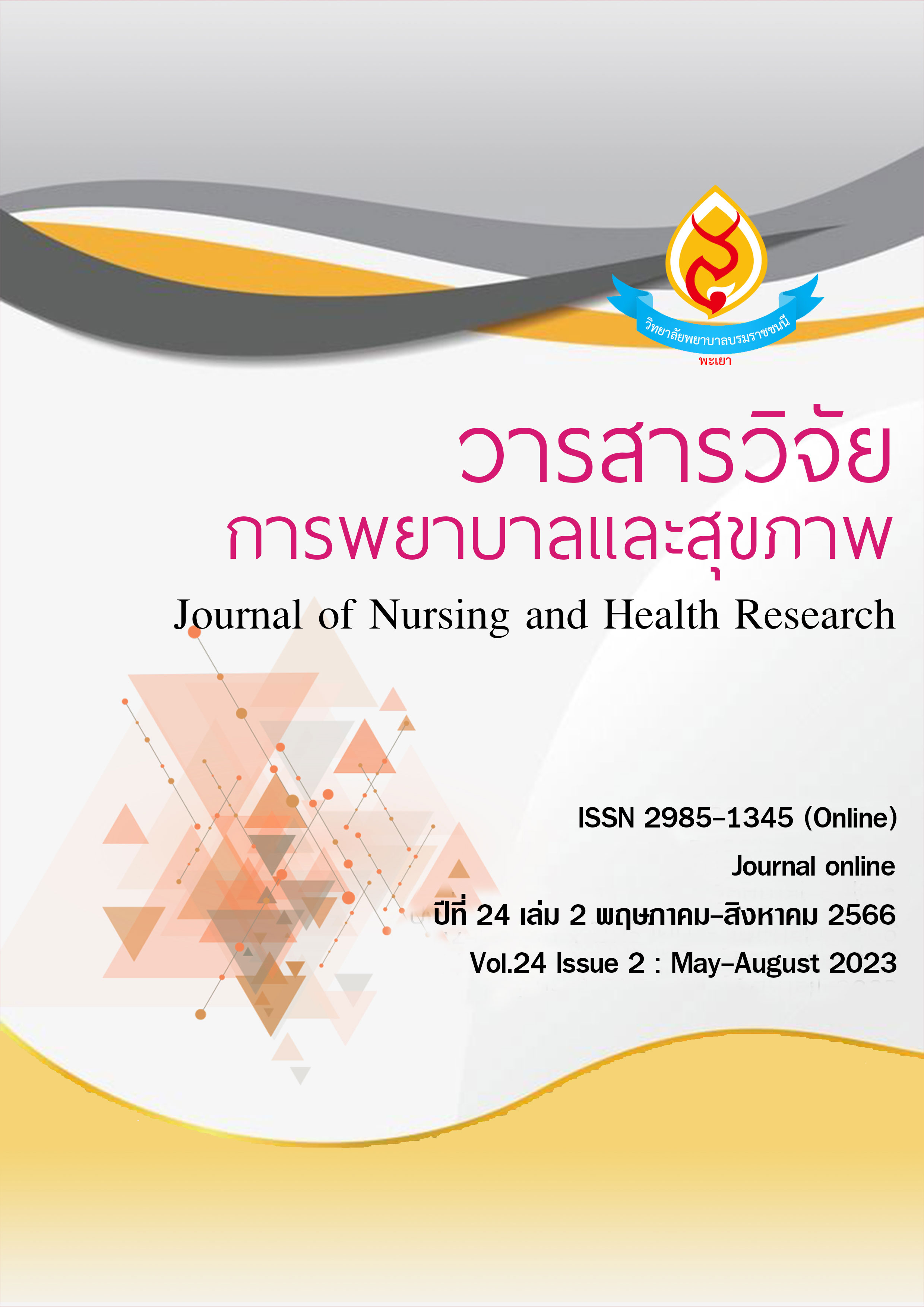ปัจจัยที่มีผลต่อความสำเร็จของการใช้กระบวนการจัดการความรู้ในการพัฒนาองค์กร
คำสำคัญ:
กระบวนการจัดการความรู้, ปัจจัยที่มีผลต่อความสำเร็จ, ระดับความสำเร็จ, การพัฒนาองค์กรบทคัดย่อ
กระบวนการจัดการความรู้เป็นเครื่องมือสำคัญสำหรับการพัฒนาสถานศึกษาให้เป็นองค์กรแห่งการเรียนรู้ การวิจัยครั้งนี้ มีวัตถุประสงค์เพื่อศึกษาระดับความสำเร็จและปัจจัยที่มีผลต่อความสำเร็จของการใช้กระบวนการจัดการความรู้ในการพัฒนาองค์กร วิทยาลัยพยาบาลบรมราชชนนี เชียงใหม่ กลุ่มตัวอย่าง คือ อาจารย์ และบุคลากรสายสนับสนุน ของวิทยาลัยพยาบาลบรมราชชนนี เชียงใหม่ จำนวน 84 คน เครื่องมือที่ใช้ในการวิจัย ได้แก่ แบบสอบถามความคิดเห็นเกี่ยวกับระดับความสำเร็จของการใช้กระบวนการจัดการความรู้และปัจจัยที่มีผลต่อความสำเร็จของการใช้กระบวนการจัดการความรู้ในการพัฒนาองค์กร ค่าความเชื่อมั่นของแบบสอบถาม ได้ค่าสัมประสิทธิ์อัลฟาของครอนบาค เท่ากับ .98 วิเคราะห์ข้อมูลด้วยสถิติเชิงพรรณนาและสถิติสมการถดถอยพหุคูณแบบขั้นตอน ผลการศึกษา พบว่า 1) คะแนนเฉลี่ยโดยรวมของระดับความสำเร็จการใช้กระบวนการจัดการความรู้ในการพัฒนาองค์กร อยู่ในระดับมาก โดยขั้นตอนการบ่งชี้ความรู้ มีคะแนนเฉลี่ยสูงสุด 2) ความคิดเห็นเกี่ยวกับปัจจัยที่มีผลต่อความสำเร็จของการใช้กระบวนการจัดการความรู้ มีคะแนนเฉลี่ยโดยรวมอยู่ในระดับมาก โดยปัจจัยด้านการสื่อสาร มีคะแนนเฉลี่ยสูงสุด 3) ปัจจัยด้านการวัดผล ด้านการสื่อสาร และด้านกระบวนการและเครื่องมือมีความสัมพันธ์แบบพหุคูณกับความสำเร็จของการใช้กระบวนการจัดการความรู้อย่างมีนัยสำคัญทางสถิติ โดยมีค่าสัมประสิทธิ์สหสัมพันธ์พหุคูณ เท่ากับ .922 (R) และปัจจัยทั้งสามสามารถพยากรณ์ถึงความสำเร็จของการใช้กระบวนการจัดการความรู้ได้ ร้อยละ 84.40 ดังนั้น การดำเนินการด้านกระบวนการจัดการความรู้เพื่อไปสู่การเป็นองค์กรสมรรถนะสูงควรให้ความสำคัญกับปัจจัยด้านการวัดผล การสื่อสาร กระบวนการและเครื่องมือ
เอกสารอ้างอิง
กนกศักดิ์ ทินราช และ วิภาดา ประสารทรัพย์. (2566). การจัดการความรู้เพื่อส่งเสริมองค์กรแห่งการเรียน รู้ของสถานศึกษา. รายงานการประชุมวิชาการนำเสนอผลงานวิจัยระดับชาติ ครั้งที่ 5 (หน้า 716-724). กรุงเทพ: มหาวิทยาลัยราชภัฏสวนสุนันทา.
กิตติมา ใจปลื้ม, นิลาวัลณ์ จันทะรังสี, อัมพล เจริญนนท์, เริงวิชญ์ นิลโคตร และวัยวุฒิ บุญลอย. (2564). การจัดการความรู้เพื่อพัฒนาสถานศึกษาให้เป็นองค์กรแห่งการเรียนรู้. วารสารมหาจุฬานาคทรรศน์, 8(6), 46-60.
ชญานิศ โฆษิตพิมานเวช และ เอกราช โฆษิตพิมานเวช. (2665). การนำผลการประกันคุณภาพการศึกษาไปปรับปรุงสถานศึกษา. วารสารมณีเชษฐารามวัดจอมมณี, 5(2), 149-167.
นันทรัตน์ เจริญกุล. (2564). การบริหารนโยบายและกลยุทธ์การศึกษา. กรุงเทพฯ : จุฬาลงกรณ์มหาวิทยาลัย.
พงษ์ศักดิ์ เพ็ชรเกิด. (2564). การพัฒนารูปแบบการจัดการความรู้ของมหาวิทยาลัยเทคโนโลยีราชมงคลศรีวิชัย วิทยาเขตตรัง. วารสารวิชาการ ปขมท., 10(1), 185–195.
พระราชบัญญัติการศึกษาแห่งชาติ ฉบับที่ 4 พ.ศ. 2562. (2562, 1 พฤษภาคม). ราชกิจจานุเบกษา เล่ม 136 ตอนที่ 57 ก. หน้า 124-128.
พัชนี กาสุริย์ วันเพ็ญ นันทะศรี และ สมเกียรติ พละจิตต์. (2561). การพัฒนารูปแบบการจัดการความรู้ในโรงเรียนขยายโอกาส ทางการศึกษา สังกัดสำนักงานเขตพื้นที่การศึกษาประถมศึกษาสกลนคร เขต 3. วารสารบัณฑิตศึกษา วิทยาลัยราชภัฏสกลนคร, 15(71), 23-29.
วันวิสาข์ คงทน. (2556). ปัจจัยที่มีอิทธิพลต่อการจัดการความรู้ของบุคลากรฝ่ายสารสนเทศ คณะแพทยศาสตร์ ศิริราชพยาบาล. วารสารวิทยบริการ, 24(2), 112-128.
วิจารณ์ พานิช. (2559). ขอบฟ้าใหม่ในการจัดการความรู้. กรุงเทพมหานคร : มูลนิธิสถาบันส่งเสริม การจัดการความรู้เพื่อสังคม.
สุกฤษฏิ์ อัญบุตร และพิมพ์อุไร ลิมปพัทธ์. (2562). การจัดการความรู้ของส่วนกำลังรบสังกัด กองทัพอากาศ. National Defence Studies Institute Journal, 10(1), 66-79.
สุทธิพร สายทอง และพระครูสังวรสุตกิจ. (2559).พุทธวิธีการจัดการความรู้สู่การพัฒนาวิทยาลัยสงฆ์ในเขตภาคเหนือตอนบน. วารสาร มจร สังคมศาสตร์ปริทรรศน์, 5(2). 85 – 96.
สุมาลี บุญเรือง และศราวุธ สังข์วรรณะ. (2560). ปัจจัยที่ส่งผลต่อการจัดการความรู้ของมหาวิทยาลัยมหาจุฬาลงกรณราชวิทยาลัย. วารสาร มจร สังคมศาสตร์ปริทรรศน์, 6(4), 225-237.
สุรมน จันทร์เจริญ. (2562). ปัจจัยที่มีต่อการจัดการความรู้ของสถานศึกษาด้านอาชีวศึกษา. วารสารสมาคมนักวิจัย, 4(3), 15-30.
อรวรรณ น้อยวัฒน์. (2556). มุมการจัดการความรู้. สืบค้นเมื่อ 1 พฤษภาคม 2564 จาก https://www.stou.ac.th/Schools/Shs/booklet/book56_4/ km.html
เอกกนก พนาดํารง. (2560). มุ่งสู่องค์กรแห่งการเรียนรู้ (learning Organization) ด้วย KM. Siriraj Medical Bulletin, 9(2), 90–92.
Faul, F., Erdfelder, E., Buchner, A., & Lang, A. G. (2009). Statistical power analyses using G*Power 3.1: tests for correlation and regression analyses. Behavior Research Methods, 41(4), 1149–1160. doi:10.3758/BRM.41.4.1149
Marquardt, M.J. (1996). Building the Learning organization: A systems approach to quantum improvement and global success. New York: McGraw-Hill. Retrieved from https://www.academia.edu/6335732/Building_the_Learning_Organization_A_Systems_Approach_to_Quantum_Improvement.
Ruggles, R. (1997). Knowledge Management Tools. London: Routledge. Retrieved from doi:10.4324/9780080509846
ดาวน์โหลด
เผยแพร่แล้ว
รูปแบบการอ้างอิง
ฉบับ
ประเภทบทความ
สัญญาอนุญาต
ลิขสิทธิ์ (c) 2023 วารสารวิจัยการพยาบาลและสุขภาพ

อนุญาตภายใต้เงื่อนไข Creative Commons Attribution-NonCommercial-NoDerivatives 4.0 International License.



